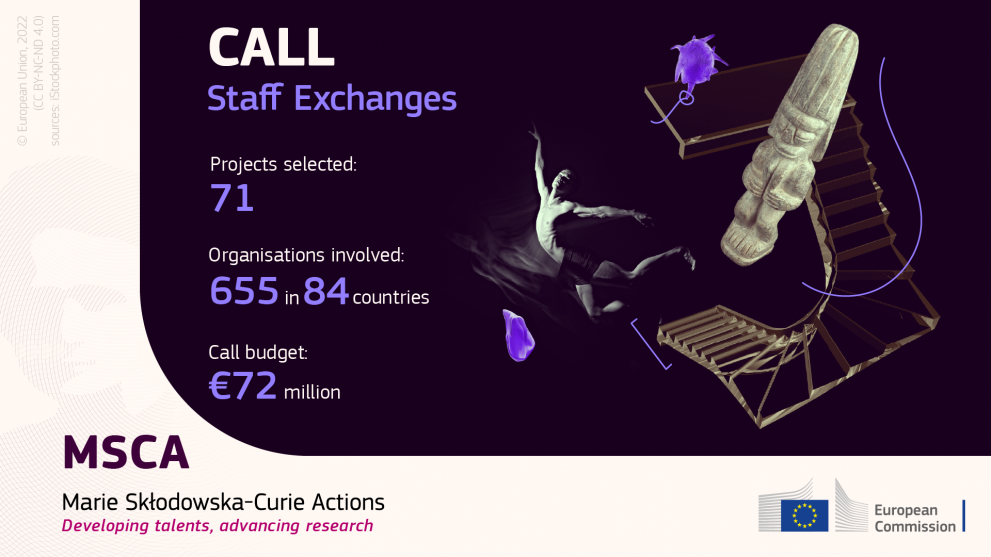
The European Research Executive Agency (REA) received 202 eligible applications with a requested budget of €211 million for the 2021 Marie Skłodowska-Curie Actions (MSCA) call for Staff Exchanges.
This first Staff Exchanges call under Horizon Europe will support over 15 600 months of staff exchanges (secondments) between academic and non-academic organisations across the world. Such staff mobility promotes long lasting collaborations, boosts career development and accelerates research and innovation outcomes.
Funding collaborations across sectors, countries, and disciplines
The European Commission will fund at least 71 Staff Exchanges projects with a budget of €72 million. This will enable the support of research staff mobility from one to twelve months in total per staff member between collaborating organisations from varying disciplines and based in different countries.
Research can be in any field. Many of the exchanges funded between European Member States (and/or Horizon Europe Associated Countries) are between the academic sector and Small and Medium Enterprises.
This interdisciplinary and intersectional collaboration is key to turning good research ideas into tangible innovations to benefit EU citizens.
Close collaborations beyond academia
Staff Exchanges projects are implemented by international partnerships. This call has awarded funding to 655 different organisations based in 84 countries, including EU member states, countries associated to Horizon Europe and beyond.
The projects count on the participation of 157 organisations from the private sector,104 of which are Small and Medium Enterprises.
Research proposals with real impact
The MSCA Staff Exchanges proposals were evaluated considering research and innovation excellence, scientific, social, and economic impacts, as well as implementation aspects.
The projects selected fall into the broad fields of:
- engineering and ICT: 37%
- social sciences and humanities: 14%
- life sciences: 11%
- chemistry: 11%
- environment and geosciences: 13%
- physics: 8%
- economics: 3%
- mathematics: 3%
The funded projects’ results will contribute towards Horizon Europe Missions, programme targets and more broadly the Commission priorities 2019-2024. These cover the European Green Deal, digital technology, economic growth, and the promotion of European values in a global context.
An overview of the evaluation results, cut-off scores and statistics has been published on the Funding and Tenders’ Portal. Once the grant agreements are finalised, the complete list of funded projects will be available on the same page, and on CORDIS.
Next steps for successful applicants
The European Research Executive Agency has sent letters to applicants, disclosing the outcome of the projects’ evaluation process. Applicants will be able to access the results on their personal space of the Funding and Tenders’ Portal.
Letters to successful applicants contain detailed instructions on how to prepare the grant agreement with the agency. First projects will start in November 2022 at the earliest. Projects on the reserve list may be contacted before or after all grant agreements for this call have been signed.
Next funding round coming soon
The next call for MSCA Staff Exchanges will open on 6 October 2022. You will find more information and detailed guidance on the MSCA website.
About the MSCA Staff Exchanges Programme
Staff Exchanges fund short-term international and inter-sectoral exchanges of staff members involved in research and innovation activities of participating organisations (maximum duration of secondments is 12 months). The aim is to develop sustainable collaborative projects between different organisations.
People involved in staff exchange programmes benefit from new knowledge, skills, and career development, while participating organisations increase their research and innovation capacities. Since 2014, the MSCA have funded over 500 successful RISE mobility projects (Horizon 2020 Framework Programme, preceding Staff Exchanges under Horizon Europe).
Useful links:
Details
- Publication date
- 7 July 2022
- Author
- European Research Executive Agency
